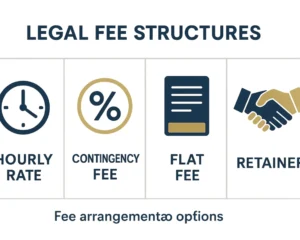One of the biggest questions people have when they need legal help is simple but crucial: “How much is this going to cost me?” The cost of hiring a lawyer is consistently cited as the number one barrier preventing people from seeking legal representation, even when they desperately need it. Understanding legal fees doesn’t have to be mysterious or intimidating — and knowing what to expect can help you make informed decisions about your legal needs without breaking the bank.
Legal fees in 2025 vary widely depending on the type of case, the lawyer’s experience, your geographic location, and the fee structure you agree to. Whether you’re facing a personal injury claim, navigating a divorce, dealing with criminal charges, or starting a business, understanding how lawyers charge for their services is the first step toward getting the legal help you need at a price you can afford.
Types of Legal Fee Arrangements Explained
Not all lawyers charge the same way, and different types of cases typically use different fee structures. Understanding these arrangements will help you know what to expect and choose the option that works best for your situation and budget.
Hourly Rate Fees
Hourly billing is one of the most common fee structures, particularly for business law, estate planning, and general legal consultation. With this arrangement, you pay for every hour (or fraction of an hour) the lawyer spends working on your case. According to the American Bar Association, hourly rates in California typically range from $200 to $600 per hour, with rates varying based on the lawyer’s experience, the complexity of your case, and your location.
In major California cities like Los Angeles, San Francisco, and San Diego, experienced attorneys at large firms may charge $400 to $800 per hour or more. Solo practitioners and attorneys at smaller firms often charge $200 to $400 per hour. Keep in mind that “billable hours” include not just time in court or meetings with you, but also research, document preparation, phone calls, emails, and any other work related to your case.
When working with an hourly rate attorney, you’ll typically pay a retainer upfront — an advance payment that the lawyer draws from as they bill hours to your case. As the retainer depletes, you may need to replenish it. Always ask for detailed billing statements showing exactly how your time was spent.
Contingency Fee Arrangements
Contingency fees are most common in personal injury cases, medical malpractice claims, employment discrimination lawsuits, and other cases where you’re seeking financial compensation. With a contingency arrangement, you pay nothing upfront, and the lawyer only gets paid if you win your case or reach a settlement.
The lawyer’s fee is a percentage of your recovery — typically 33% to 40% in California, though this can vary. For example, if you win a $100,000 settlement and your lawyer’s contingency fee is 33%, the lawyer receives $33,000 and you receive $67,000 (minus any case expenses). If you don’t win, you typically owe nothing for the lawyer’s time, though you may still be responsible for court costs and other expenses.
Contingency fees make legal representation accessible to people who couldn’t otherwise afford to pay hundreds of dollars per hour for a lawyer. They also align the lawyer’s interests with yours — the lawyer is motivated to get you the best possible outcome because their payment depends on it. As discussed in our guide on how to choose the right lawyer, understanding fee structures is crucial to finding representation that fits your needs.
Flat Fee Services
Some lawyers charge a single flat fee for specific services, particularly for routine legal matters with predictable scope. Common flat fee services include uncontested divorces, simple wills and estate planning documents, trademark registration, LLC formation, traffic ticket representation, and name changes.
Flat fees in California might range from $500 for a simple will to $3,000 for an uncontested divorce to $1,500 for forming a business entity. The advantage of flat fees is predictability — you know exactly what you’ll pay upfront, with no surprise bills. However, flat fees typically only cover the agreed-upon services. If complications arise or additional work is needed, you may face additional charges.
Always get the flat fee agreement in writing, clearly specifying what services are included and what would constitute additional work requiring extra payment.
Retainer Agreements
A retainer is an upfront payment that secures a lawyer’s services and is held in a special trust account. There are two types of retainers: a “true retainer” (a fee paid simply to ensure the lawyer’s availability) and a “security retainer” (an advance payment from which the lawyer bills for work performed).
Most retainers are security retainers. The lawyer bills against the retainer as work is completed, and you may need to replenish it when it runs low. Any unused portion should be refunded to you when the case concludes. Retainers for California lawyers typically range from $2,500 to $10,000 or more, depending on the type and complexity of the case.
Average Legal Costs by Practice Area in California
While every case is unique, understanding typical costs for different types of legal matters can help you budget and know what questions to ask. These are approximate ranges based on 2025 California averages — your actual costs may vary significantly.
For personal injury cases, most lawyers work on contingency (33% to 40% of recovery), with no upfront costs. Family law matters like divorce typically cost $15,000 to $30,000 for contested cases, or $3,000 to $7,000 for uncontested divorces. Criminal defense fees range from $2,500 to $10,000 for misdemeanors and $10,000 to $50,000 or more for felonies, depending on complexity.
Estate planning services usually run $1,000 to $3,000 for a complete estate plan including will, trust, and powers of attorney. Business formation costs typically range from $1,500 to $5,000 for LLC or corporation setup. Immigration cases vary widely, from $1,500 to $5,000 for green card applications to $3,000 to $10,000 for deportation defense.
Real estate transactions often cost $1,500 to $3,000 for residential closings, while employment law cases may run $5,000 to $15,000 for wrongful termination or discrimination claims. Bankruptcy filings typically cost $1,500 to $3,500 for Chapter 7 or $3,000 to $6,000 for Chapter 13.
Hidden Costs and Additional Expenses to Watch For
The lawyer’s fee is just one part of your total legal costs. Understanding additional expenses can help you avoid surprise bills and budget accurately for your legal needs.
Court filing fees are required to file lawsuits, motions, and other court documents. In California, these can range from $200 to $500 or more depending on the type of case. Expert witness fees apply when specialists are needed to testify — medical experts, accident reconstructionists, forensic accountants, and others may charge $300 to $500 per hour or more.
Deposition costs include court reporter fees ($500 to $1,500 per deposition) and transcript preparation. Investigation expenses cover private investigators, background checks, and evidence gathering. Document production and copying costs can add up, especially in complex cases with extensive paperwork.
Travel expenses may apply if your lawyer needs to travel for your case, including mileage, airfare, hotels, and meals. Administrative fees sometimes include charges for postage, long-distance calls, and document storage. Some of these costs may be included in your fee agreement, while others are billed separately. Always ask upfront which costs are included and which are additional.
According to California Courts Self-Help resources, understanding all potential costs before hiring a lawyer is essential to avoiding financial surprises.
Questions to Ask About Fees Before Hiring
Before you sign any fee agreement, make sure you understand exactly what you’re agreeing to pay. Ask these essential questions: What is your fee structure for my type of case? What is your hourly rate, contingency percentage, or flat fee? What is the initial retainer or upfront payment required? What expenses are included in your fee, and what costs extra?
Also ask: How often will I receive billing statements? Can you provide an estimate of total costs for my case? What happens if my case takes longer than expected? Under what circumstances might fees increase? What is your policy on refunding unused retainer funds? Can we negotiate the fee arrangement? Do you offer payment plans?
A reputable lawyer will answer these questions clearly and provide a written fee agreement detailing all terms. If a lawyer is evasive about fees or refuses to put the agreement in writing, consider that a red flag.
Making Legal Help Affordable: Payment Options and Alternatives
If you need legal help but are concerned about costs, you have more options than you might think. Many lawyers offer payment plans, allowing you to pay legal fees over time rather than all upfront. While not all attorneys offer this option, it’s always worth asking — particularly for family law, criminal defense, and other cases where clients often face financial strain.
Legal aid organizations provide free legal services to low-income individuals for certain types of cases, including housing disputes, family law matters, and public benefits issues. California has numerous legal aid organizations serving different regions and practice areas. Pro bono services are offered by some lawyers who donate a portion of their time to clients who cannot afford representation.
Law school clinics, operated by law schools throughout California, offer free or low-cost legal help provided by law students under attorney supervision. Limited scope representation, also called “unbundled services,” allows you to hire a lawyer for specific tasks rather than full representation — for example, hiring a lawyer just to review documents or coach you for a court appearance while you handle other aspects yourself.
Prepaid legal plans work like insurance, where you pay a monthly fee for access to legal services when needed. Sliding scale fees are offered by some attorneys who adjust their rates based on your income and ability to pay. Don’t let cost prevent you from seeking legal help — explore these options and be upfront with lawyers about your budget constraints.
Protecting Yourself: Understanding Fee Agreements
Your fee agreement is a contract between you and your lawyer, and it’s one of the most important documents you’ll sign. California law requires fee agreements to be in writing for most types of cases, and you should never hire a lawyer without a clear written agreement.
A proper fee agreement should specify the fee structure (hourly, contingency, flat fee, or retainer), the rate or percentage, what services are covered, what expenses are additional, how and when you’ll be billed, and how disputes about fees will be resolved. It should also outline the scope of representation (what the lawyer will and won’t do), how either party can terminate the relationship, and what happens to any unused retainer.
Read the entire agreement carefully before signing. Don’t be afraid to ask questions or request changes. If something isn’t clear, ask for clarification. If you’re uncomfortable with any terms, discuss them with the lawyer or consider seeking a second opinion. As noted in our article on common legal mistakes to avoid, signing agreements you don’t fully understand is a recipe for problems.
If you believe you’ve been overcharged or that a lawyer has acted unethically regarding fees, California has fee dispute resolution programs through local bar associations. You can also file a complaint with the State Bar of California if you believe a lawyer has violated ethical rules.
Getting the Legal Help You Need at a Price You Can Afford
Understanding legal fees is empowering. When you know what to expect, what questions to ask, and what options are available, you can make informed decisions about your legal representation without fear of hidden costs or surprise bills.
Remember that the cheapest lawyer isn’t always the best value, and the most expensive lawyer isn’t necessarily the most qualified for your specific needs. Focus on finding a lawyer with the right experience for your case, a fee structure that works for your budget, and a communication style that makes you comfortable.
Don’t let fear of costs prevent you from seeking legal help when you need it. Many legal problems only get more expensive the longer they’re ignored. A consultation with a qualified attorney — many offer free initial consultations — can help you understand your options and make a plan that protects your rights without destroying your finances.
Legal fees are an investment in protecting your rights, your family, your business, or your future. With transparency, clear communication, and the right fee arrangement, quality legal representation is more accessible than you might think. Take the time to understand your options, ask the right questions, and find a lawyer who respects both your legal needs and your budget.







